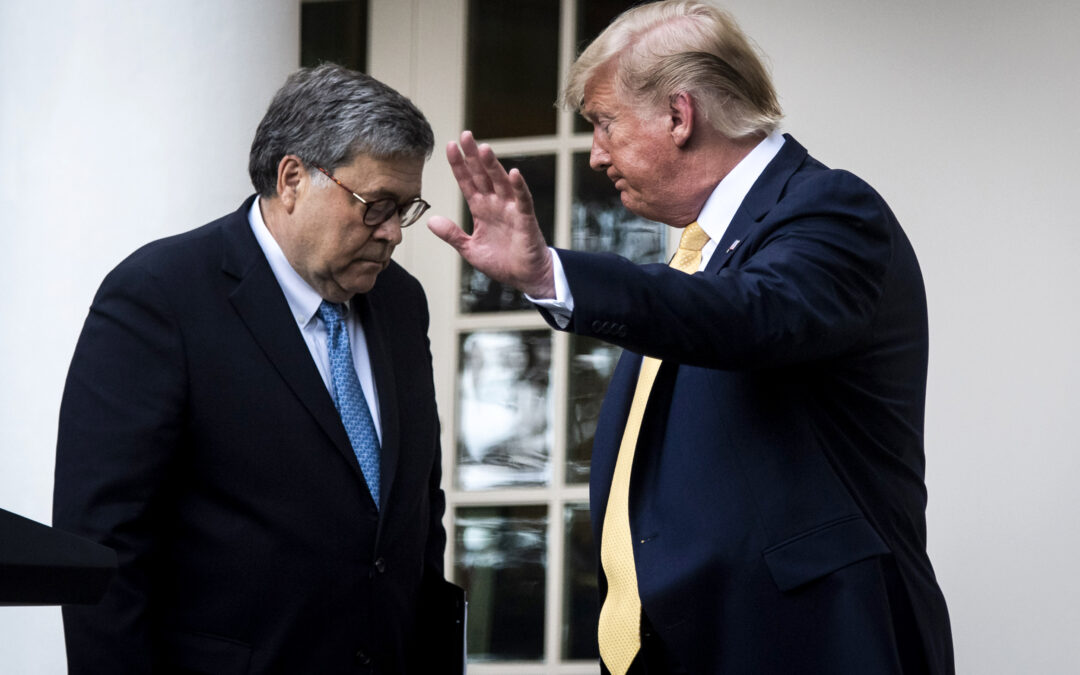Attorney General William Barr, wading into President Trump’s unfounded accusations of widespread election irregularities, told federal prosecutors late today that they were allowed to investigate “specific allegations” of voter fraud before the results of the presidential race are certified.
The New York Times: Barr’s authorization prompted the Justice Department official who oversees investigations of voter fraud, Richard Pilger, to step down from the post within hours, according to an email Pilger sent to colleagues.
Barr said he had authorized “specific instances” of investigative steps in some cases.
He made clear in a carefully worded memo that prosecutors had the authority to investigate, but he warned that “specious, speculative, fanciful or far-fetched claims should not be a basis for initiating federal inquiries.”
Barr’s directive ignored the Justice Department’s longstanding policies intended to keep law enforcement from affecting the outcome of an election.
And it followed a move weeks before the election in which the department lifted a prohibition on voter fraud investigations before an election.
“Given that voting in our current elections has now concluded, I authorize you to pursue substantial allegations of voting and vote tabulation irregularities prior to the certification of elections in your jurisdictions,” Barr wrote.
A Justice Department official said that Barr had authorized scrutiny of allegations about ineligible voters in Nevada and backdated mail-in ballots Pennsylvania.
Republicans have circulated both claims in recent days without any evidence emerging to back them.
Critics of Barr immediately condemned the memo as a political act that undermined the Justice Department’s typical independence from the White House.
“It would be problematic enough if Barr were reversing longstanding Justice Department guidance because of significant, substantiated claims of misconduct — that could presumably be handled at the local and state level,” said Stephen I. Vladeck, a professor at the University of Texas School of Law.
“But to do so when there is no such evidence — and when the president’s clear strategy is to delegitimize the results of a proper election — is one of the more problematic acts of any attorney general in my lifetime,” Vladeck added.
Pilger, a career prosecutor in the department’s Public Integrity Section who oversaw voting-fraud-related investigations, told colleagues he would move to a nonsupervisory role working on corruption prosecutions.
“Having familiarized myself with the new policy and its ramifications,” he wrote, “I must regretfully resign from my role as director of the Election Crimes Branch.”
A Justice Department spokeswoman did not immediately respond to a request for comment about Pilger’s message.
Justice Department policies prohibit federal prosecutors from taking overt steps, like questioning witnesses or securing subpoenas for documents, to open a criminal investigation into any election-related matter until after voting results have been certified to keep their existence from spilling into public view and influencing either voters or local election officials who ensure the integrity of the results.
“Public knowledge of a criminal investigation could impact the adjudication of election litigation and contests in state courts,” the Justice Department’s longstanding election guidelines for prosecutors say. “Accordingly, it is the general policy of the department not to conduct overt investigations.”
Biden has won enough electoral votes to be president-elect, but Trump and his administration refuse to acknowledge it.
